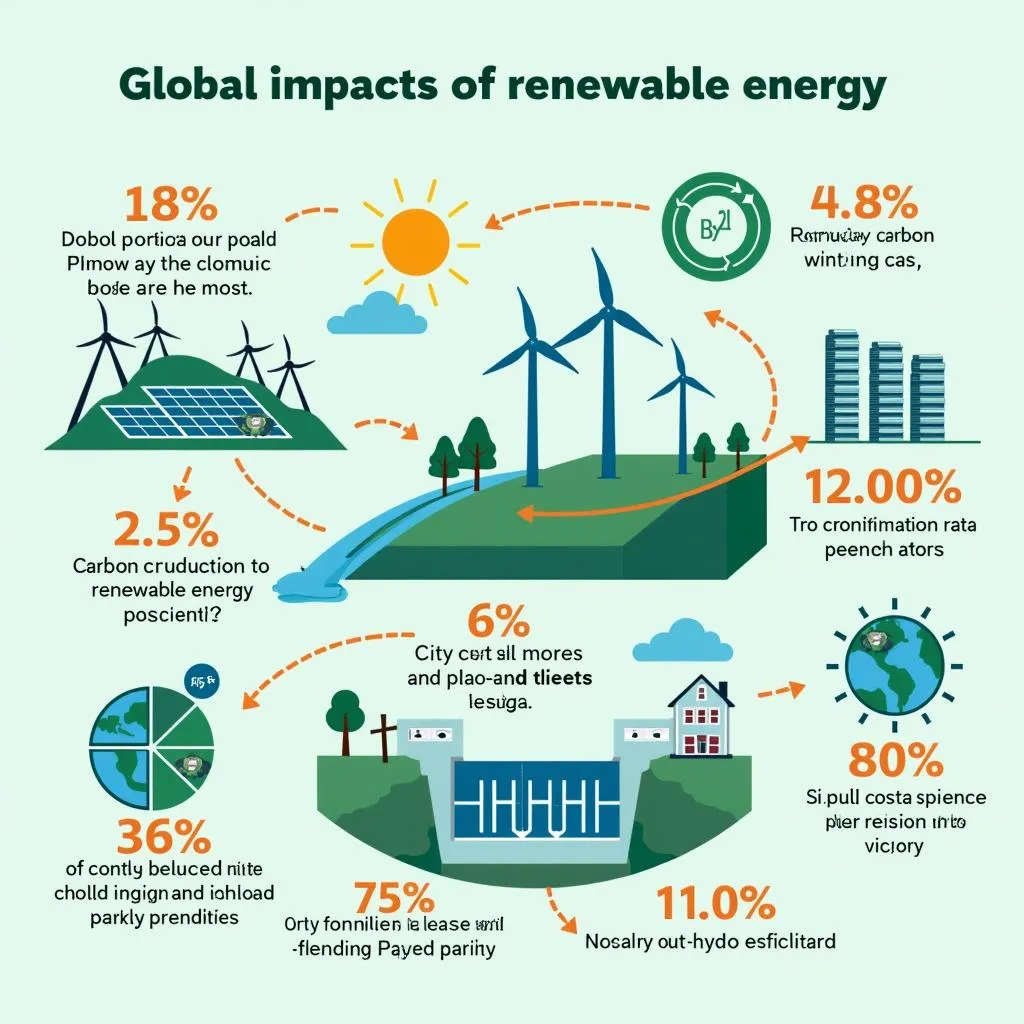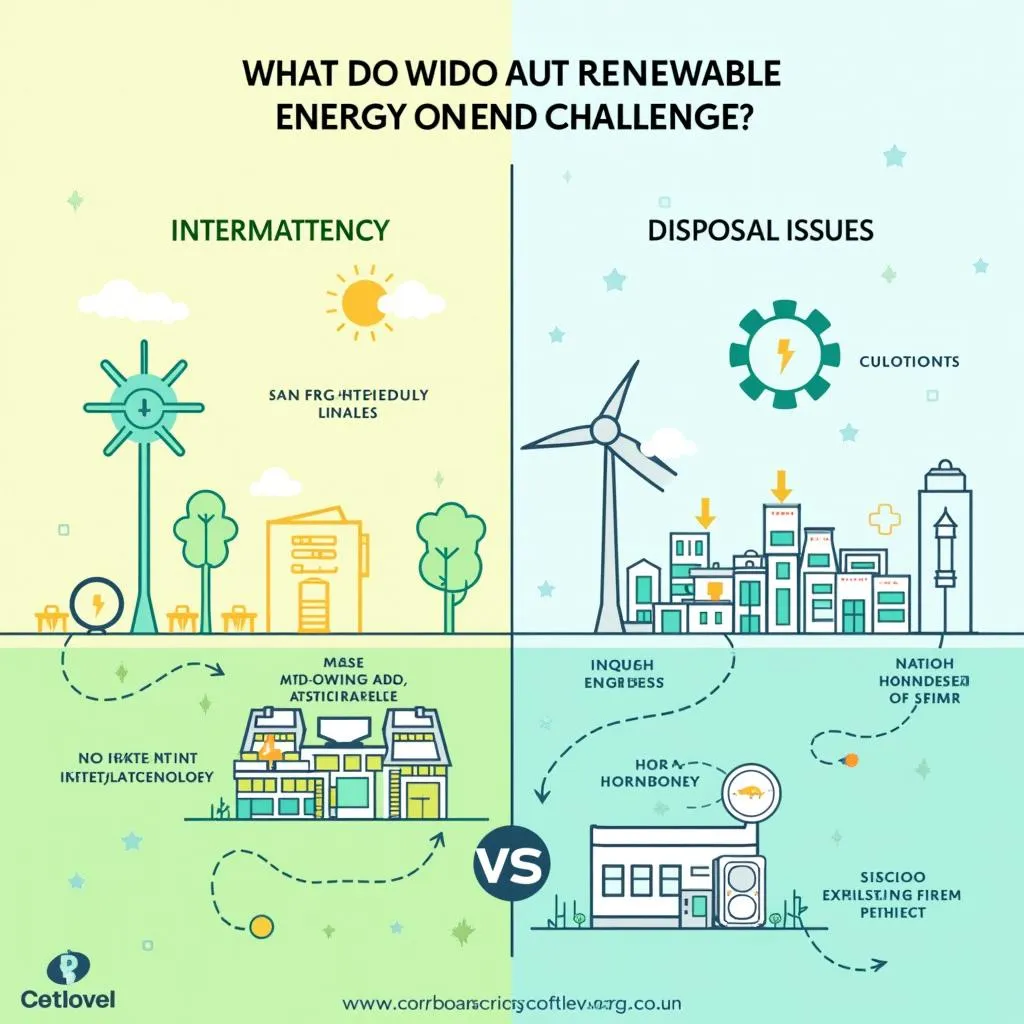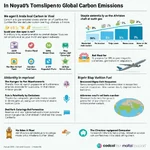Renewable energy and its impact on achieving a carbon-neutral future is a topic of growing importance in IELTS Writing Task 2. This theme has appeared in various forms over the past few years and is likely to continue being a popular subject due to its relevance to global environmental concerns. Based on recent trends, we can expect to see questions related to renewable energy, climate change, and sustainability in future IELTS exams.
Let’s examine a relevant question that has appeared in recent IELTS tests:
Some people believe that the development of renewable energy sources is crucial for addressing climate change, while others argue that it is not a practical solution. Discuss both views and give your own opinion.
Analysis of the Question
This question requires candidates to:
- Discuss the view that renewable energy development is crucial for addressing climate change
- Discuss the opposing view that renewable energy is not a practical solution
- Provide their own opinion on the matter
It’s important to note that this question asks for a balanced discussion of both perspectives before presenting a personal stance. Let’s look at sample essays for different band scores to understand how to approach this task effectively.
Sample Essay 1 (Band 8-9)
Climate change is one of the most pressing issues of our time, and the role of renewable energy in combating this global threat is a topic of intense debate. While some argue that developing renewable energy sources is essential for addressing climate change, others contend that it is not a viable solution. In my opinion, while renewable energy alone may not be a panacea, it is a crucial component in our efforts to mitigate climate change and should be vigorously pursued.
Proponents of renewable energy argue that it is indispensable in the fight against climate change. Firstly, renewable sources such as solar, wind, and hydroelectric power produce minimal greenhouse gas emissions compared to fossil fuels, thereby reducing our carbon footprint. Additionally, as technology advances, renewable energy is becoming increasingly cost-effective and efficient, making it a more practical alternative to traditional energy sources. The role of renewable energy in reducing carbon footprints cannot be overstated, as it offers a sustainable path towards a cleaner, greener future.
On the other hand, critics argue that renewable energy is not a practical solution to climate change. They point out that renewable sources are often intermittent and unreliable, depending on factors like weather conditions. Moreover, the initial investment required for large-scale renewable energy infrastructure can be prohibitively expensive for many countries, particularly developing nations. There are also concerns about the environmental impact of manufacturing and disposing of renewable energy equipment, such as solar panels and wind turbines.
In my view, while the challenges associated with renewable energy are valid, they are not insurmountable. The benefits of transitioning to renewable energy far outweigh the drawbacks, especially when considering the long-term consequences of continued reliance on fossil fuels. Technological advancements are rapidly addressing issues of intermittency and storage, making renewable sources increasingly reliable. Furthermore, as economies of scale come into play, the costs of renewable energy infrastructure are likely to decrease, making it more accessible to developing nations.
In conclusion, while renewable energy may not be a perfect solution, it is an essential component in our strategy to combat climate change. The potential of renewable sources to significantly reduce greenhouse gas emissions, coupled with ongoing technological improvements, makes it a crucial avenue to explore and develop. To effectively address climate change, we must embrace a multi-faceted approach that includes renewable energy as a cornerstone, alongside other measures such as energy efficiency and conservation.
 Renewable energy solutions for climate change
Renewable energy solutions for climate change
Explanation of Band 8-9 Score
This essay demonstrates the qualities of a high-scoring response:
- Task Achievement: The essay fully addresses all parts of the task, discussing both views and clearly presenting the writer’s opinion.
- Coherence and Cohesion: Ideas are logically organized with clear progression throughout the essay. Paragraphs are well-linked, and cohesive devices are used effectively.
- Lexical Resource: A wide range of vocabulary is used accurately and appropriately, with some less common phrases (e.g., “panacea,” “vigorously pursued,” “prohibitively expensive”).
- Grammatical Range and Accuracy: The essay displays a wide range of grammatical structures used accurately and flexibly, with only minor errors.
Sample Essay 2 (Band 6-7)
Climate change is a big problem today, and people have different ideas about how to solve it. Some think renewable energy is very important, while others say it’s not practical. I will discuss both sides and give my opinion.
People who support renewable energy say it’s crucial for fighting climate change. Renewable sources like solar and wind power don’t produce much pollution, which is good for the environment. Also, as technology gets better, renewable energy is becoming cheaper and more efficient. This makes it a good choice instead of using fossil fuels that harm the environment.
However, some people argue that renewable energy is not a practical solution. They say that renewable sources are not always reliable because they depend on things like the weather. For example, solar panels don’t work well on cloudy days. Another problem is that it costs a lot of money to build renewable energy systems, which can be difficult for poorer countries. Some people also worry about the environmental impact of making and disposing of things like solar panels.
In my opinion, I think renewable energy is very important for dealing with climate change, even though it has some problems. The benefits of using renewable energy are bigger than the drawbacks, especially when we think about the long-term effects of using fossil fuels. Technology is getting better all the time, which means renewable energy will become more reliable and cheaper in the future.
To manage the impact of rising global temperatures, we need to use many different solutions, and renewable energy should be an important part of our plan. We should keep working on making renewable energy better while also finding other ways to help the environment.
 Challenges and solutions in renewable energy adoption
Challenges and solutions in renewable energy adoption
Explanation of Band 6-7 Score
This essay demonstrates the qualities of a mid-range response:
- Task Achievement: The essay addresses all parts of the task, presenting both views and the writer’s opinion, but with less depth and development compared to the higher band essay.
- Coherence and Cohesion: The essay is generally well-organized, but the use of cohesive devices is less sophisticated and varied.
- Lexical Resource: A sufficient range of vocabulary is used, but it lacks the precision and sophistication of higher band essays.
- Grammatical Range and Accuracy: The essay uses a mix of simple and complex sentence structures with generally good control, though there are some errors and limitations in expression.
Key Vocabulary to Remember
- Renewable energy (noun) – /rɪˈnjuːəbəl ˈenədʒi/ – Energy from a source that is not depleted when used
- Carbon-neutral (adjective) – /ˈkɑːbən ˈnjuːtrəl/ – Making no net release of carbon dioxide to the atmosphere
- Climate change (noun) – /ˈklaɪmət tʃeɪndʒ/ – Long-term alteration of temperature and typical weather patterns
- Greenhouse gas emissions (noun) – /ˈɡriːnhaʊs ɡæs ɪˈmɪʃənz/ – Release of gases that contribute to the greenhouse effect
- Sustainability (noun) – /səˌsteɪnəˈbɪləti/ – Avoidance of depletion of natural resources to maintain ecological balance
- Intermittent (adjective) – /ɪntəˈmɪtənt/ – Occurring at irregular intervals; not continuous or steady
- Infrastructure (noun) – /ˈɪnfrəstrʌktʃə/ – Basic physical and organizational structures needed for operation
- Mitigation (noun) – /ˌmɪtɪˈɡeɪʃən/ – The action of reducing the severity, seriousness, or painfulness of something
- Panacea (noun) – /ˌpænəˈsiːə/ – A solution or remedy for all difficulties or diseases
- Transition (noun) – /trænˈzɪʃən/ – The process or period of changing from one state or condition to another
Conclusion
The topic of renewable energy and its role in achieving a carbon-neutral future is likely to remain relevant in IELTS Writing Task 2. To prepare effectively, practice writing essays on related themes such as:
- The economic impact of transitioning to renewable energy sources
- Government policies to promote renewable energy adoption
- The role of individuals in supporting renewable energy initiatives
- Balancing economic growth with environmental sustainability
Remember to structure your essays clearly, use a range of vocabulary and grammatical structures, and provide well-developed arguments supported by examples. Practice writing your own essay on the given topic and consider sharing it in the comments section for feedback and discussion. This active approach to learning will help you improve your IELTS Writing skills and prepare you for success in the exam.


